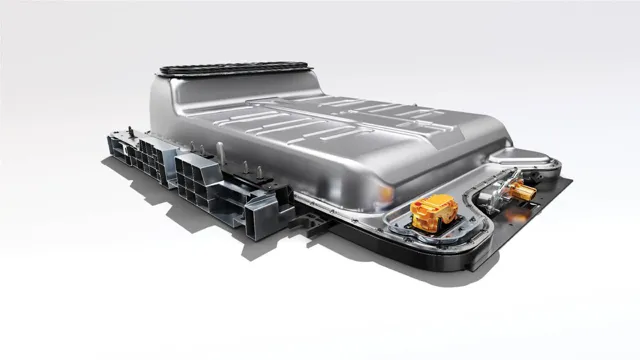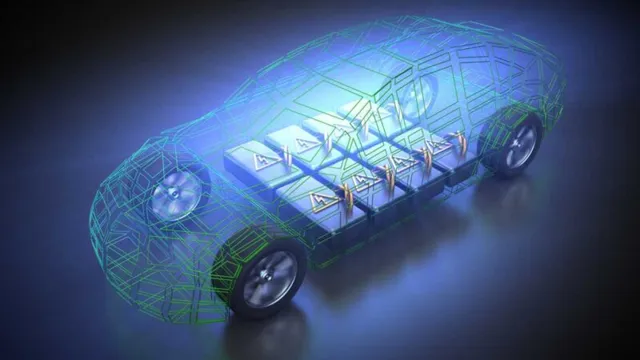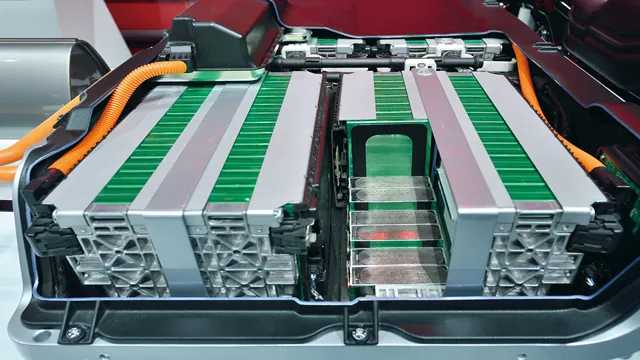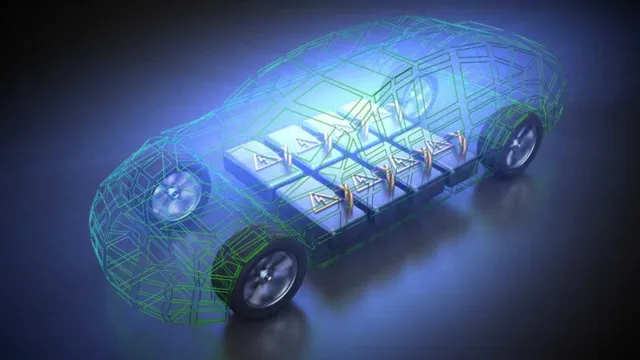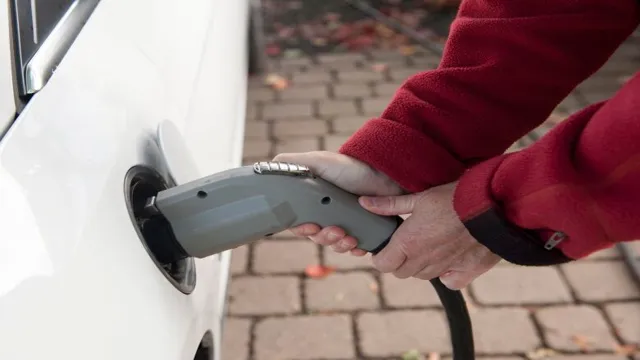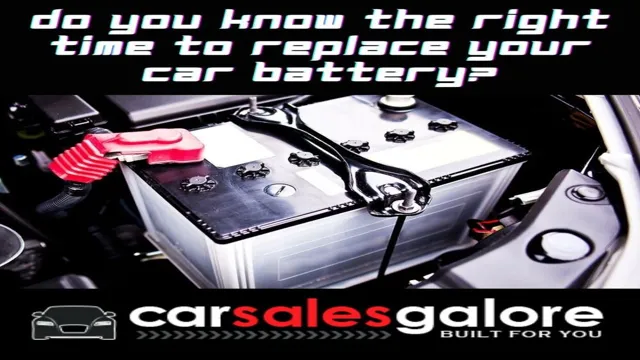Revolutionary electric car battery with 600-mile range – Is this the future of electric vehicles?
Have you ever wished you could travel further on a single charge in your electric car? Well, the good news is that the future of electric car batteries looks promising. With new advances in technology, it’s becoming increasingly possible to go up to 600 miles on a single charge. That’s more than double what most electric cars can do today.
Imagine being able to travel long distances without having to worry about recharging your battery every few hours. It’s a game-changer for those who love long road trips but don’t want to sacrifice their commitment to green transportation. So, what’s behind this revolutionary advancement? Let’s take a closer look at the future of electric car batteries.
The Current State of Electric Vehicle Batteries
Experts in the electric vehicle industry are constantly working to improve the current state of electric car batteries. With the goal of creating a battery that can power a vehicle for 600 miles on a single charge, research and development has increased in recent years. While current electric vehicles can typically travel between 200-300 miles on a charge, advancements in battery technology have allowed for longer ranges.
The latest lithium-ion batteries, for example, have a higher energy density, allowing for more power to be stored in a smaller space. Furthermore, solid-state batteries – which are still in the development stage – could have even higher energy densities, longer lifespans, and faster charging times than the current lithium-ion batteries. As the technology continues to advance, it is likely that electric car batteries will become even more efficient and powerful, making them a more viable option for long-distance travel.
The average electric car has a range of 150-300 miles on a single charge
The current state of electric vehicle batteries is one of constant technological evolution. As it stands, the average electric car has a range of 150-300 miles on a single charge, which is an impressive feat considering the early days of electric cars where ranges were often limited to under 100 miles. Battery technology has come a long way, and the good news is that it continues to improve.
There are a few factors that contribute to the range of an electric car. These include the size of the battery, the efficiency of the electric motor, and the weight of the car. As battery technology continues to improve, cars are becoming lighter, more efficient, and able to store more energy for longer periods of time.
There are even some experimental battery technologies that promise to deliver ranges of up to 1,000 miles on a single charge, which would be revolutionary for the electric car industry. All in all, the future of electric vehicle batteries looks bright, and we can expect even more impressive advancements in the years to come.

Battery technologies are being developed for longer range, but with tradeoffs in cost and weight
The electric vehicle (EV) industry is frequently moving forward with new advancements being made in the field every day. One of the biggest challenges faced by EVs is the range of their batteries. Currently, lithium-ion batteries are being used for most EV models offering reliability and efficiency.
However, battery technologies are being developed for longer range, but with tradeoffs in cost and weight. Many EV manufacturers are keenly focused on developing batteries that will give drivers a wider range of travel without the need for a recharge. At the same time, the cost of producing these new battery technologies is still quite high, which affects the price of EVs.
Furthermore, the extra weight of these batteries makes it more challenging to increase the range without sacrificing performance. Despite these challenges, as technology continues to evolve, electric vehicle batteries will become more efficient, reliable, and affordable, making it easier for individuals to switch to these eco-friendly vehicles.
Innovations in Battery Technology
Have you ever heard of an electric car battery that can go up to 600 miles without needing a recharge? This might sound like science fiction, but it’s becoming a reality thanks to several innovative advancements in battery technology. One of the latest and most promising solutions is solid-state batteries, which use solid electrolytes instead of liquid ones like traditional lithium-ion batteries. These new batteries offer several advantages, including better energy density, longer lifespans, and faster charging times.
In fact, Toyota has already developed a solid-state battery that can recharge an electric car in just 10 minutes. Other companies, such as QuantumScape and Solid Power, are also working on their own versions of solid-state batteries that promise even more impressive results. With these advancements in battery technology, we can expect to see electric cars become even more practical, reliable, and accessible to a wider audience.
Solid-state batteries use a solid electrolyte, offering higher energy density and safety
Innovations in Battery Technology have led to the development of solid-state batteries, which offer higher energy density and safety. Unlike traditional lithium-ion batteries that use a liquid electrolyte, solid-state batteries use a solid electrolyte. This electrolyte is made of a material that is non-flammable and less reactive than the liquid electrolytes used in traditional batteries.
As a result, these new batteries are more stable and safer to use, making them a great alternative for applications that require high performance and durability. Additionally, solid-state batteries are also capable of storing more energy per unit of weight compared to traditional batteries. This means that smaller, more powerful batteries can be developed, which can be used in a variety of applications ranging from smartphones and laptops to electric vehicles and solar energy systems.
All in all, these innovations in battery technology are paving the way for a more sustainable and energy-efficient future.
Silicon-anode batteries use silicon instead of graphite, increasing energy density
With advancements in technology, battery innovation has been one of the most significant over the years. One notable innovation in battery technology is the development of silicon-anode batteries. Unlike traditional batteries that use graphite, silicon-anode batteries use silicon as the main component of the anode.
This results in an increase in energy density, which means that the battery can store more energy in the same size. Silicon can hold up to ten times more lithium than graphite, which makes it an excellent choice for batteries. Silicon anodes are also more durable, which translates to a longer lifespan.
However, the use of silicon as the main component also poses a challenge. Silicon is known to expand and contract more than graphite, which can cause the battery to swell and potentially damage the other components. Researchers are still working to overcome this issue, but the benefits of increased energy storage make it a technology to watch.
Lithium-sulfur batteries are cheaper and lighter, with potential for higher energy density
Battery Technology, Lithium-sulfur batteries, energy density, innovations. Innovations in battery technology have been driving the development of lithium-sulfur batteries, which have the potential to offer cheaper and lighter energy storage solutions than traditional lithium-ion batteries. Lithium-sulfur batteries have higher theoretical energy densities than lithium-ion batteries, which means they can potentially store more energy in the same amount of space.
In addition to their higher energy density, lithium-sulfur batteries are also cheaper and easier to manufacture, as they use fewer rare earth materials. This makes them an attractive alternative to traditional lithium-ion batteries, which have been criticized for being expensive and reliant on rare earth materials. While there are still some challenges to overcome, such as reducing the rate of capacity loss over time, many researchers believe that lithium-sulfur batteries have the potential to transform the energy storage industry.
With their lightweight, high-energy-density, and potentially low-cost design, lithium-sulfur batteries could be the key to unlocking a new era of sustainable energy.
Potential Benefits of a 600-Mile Electric Car Battery
Imagine being able to drive your electric car for 600 miles without having to recharge the battery. Sounds too good to be true, right? Well, with the continuous advancements in battery technology, this might soon become a reality. A 600-mile electric car battery would revolutionize the way we travel, making long-distance trips more convenient and practical.
It would also eliminate the range anxiety that many electric car drivers experience, as the extended range would provide a safety net even under extreme driving conditions. Moreover, a 600-mile battery could potentially reduce the need for fast-charging stations, as drivers could travel longer distances before needing to find a charging point. This could result in fewer charging stations being required, which could help reduce the cost of electric vehicle infrastructure in the long run.
All in all, a 600-mile electric car battery would be a game-changer, and it would significantly enhance the appeal of electric vehicles to a broader range of consumers.
Less range anxiety, allowing for longer road trips and more convenience
The advent of a 600-mile electric car battery could bring immense benefits to electric vehicle enthusiasts, especially in terms of less range anxiety. With a longer driving range, drivers will have more time to enjoy their journeys without worrying about running out of charge. They will no longer have to compromise on their travel plans or waste precious time looking for charging stations along the way.
This will allow them to go on longer road trips and travel more conveniently, whether it’s for business or leisure. It’s like having a bigger fuel tank, but without the need to stop frequently for refueling. The concept of never running out of gas is a luxury and one that electric car drivers can now enjoy with a 600-mile battery.
Reduced need for charging infrastructure, making electric cars more practical for rural areas
The idea of a 600-mile electric car battery sounds like something out of a science fiction movie, but it could soon become a reality. If this technology were to be developed, there could be a range of benefits for both urban and rural drivers. One major advantage would be a reduced need for charging infrastructure, which would make electric cars more practical for people who live in areas where charging stations are scarce.
Rural drivers could travel long distances without having to worry about running out of power, while urban drivers could enjoy the convenience of not needing to charge their vehicle as frequently. This would also help to reduce the overall cost of owning an electric car, as charging stations can be expensive to install and maintain. All in all, a 600-mile electric car battery could help to make electric vehicles more accessible and practical for drivers all over the world.
The Road to a 600-Mile Electric Car Battery
With the increasing demand for electric vehicles, car manufacturers are striving to develop batteries that can deliver longer driving ranges. One of the holy grails of electric car batteries is a range of 600 miles on a single charge, which would already put electric cars on par with gasoline vehicles in terms of practicality. However, achieving this feat is easier said than done.
Car manufacturers are currently exploring different approaches to increase battery capacity and range, including using new chemistries, improving manufacturing processes, and reducing the weight and size of the battery pack. But the challenge is not only technical – there are also economic constraints to consider, as long-range batteries are not only costly to manufacture but also heavy and bulky. Nevertheless, with the growing global demand for electric vehicles, it’s just a matter of time until we see electric cars with 600-mile ranges charging up at our local stations.
Conclusion
In a nutshell, the phrase “electric car battery 600 miles” is an exciting prospect for the future of sustainable transportation. Imagine being able to travel nearly twice the distance of current electric vehicles without needing a recharge! With advancements in technology and continued investment in renewable energy sources, it’s only a matter of time before we see this kind of innovation become a reality. So, buckle up and stay charged – the electric car revolution is just getting started!”
FAQs
How far can an electric car battery travel on a single charge?
Depending on the make and model, some electric car batteries can travel up to 600 miles on a single charge.
How long does it take to charge an electric car battery to travel 600 miles?
The charging time will vary depending on the make and model of the car and the type of charging station used. On average, it can take anywhere from 30 minutes to a few hours to charge an electric car battery to travel 600 miles.
How much does it cost to replace an electric car battery that can travel 600 miles?
On average, the cost to replace an electric car battery that can travel 600 miles ranges from $5,000 to $15,000, depending on the make and model of the car.
What are some tips for maximizing an electric car battery’s life to travel 600 miles?
To maximize an electric car battery’s life to travel 600 miles, it’s important to avoid rapid acceleration and hard braking, turn off any unnecessary features, and use regenerative braking to recharge the battery. It’s also important to keep the battery at a moderate temperature and avoid exposing it to extreme temperatures.
